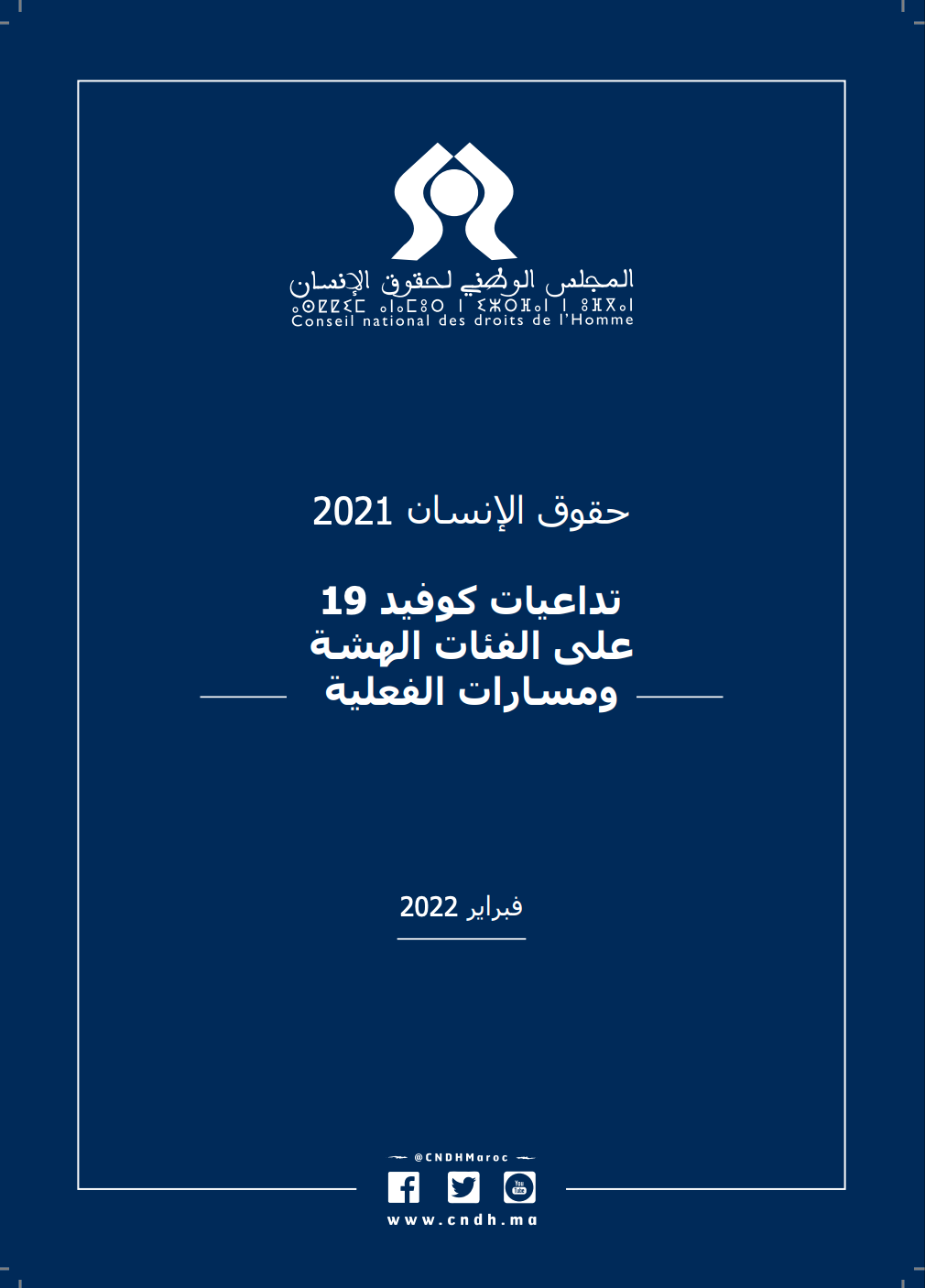
- Migration ,
- Women's Rights ,
- Rights of the Child ,
- Protection of Persons with Disabilities ,
- Preservation of Memory ,
- Freedom of Expression, Assembly, Demonstration and Association ,
- Access to Justice & the Rights of Persons Deprived of Liberty ,
- Business & Human Rights ,
- Right to Life and Abolition of the Death Penalty ,
- Technology, Artificial Intelligence & Human Rights ,
- Climate Change & the Right to a Clean and Sustainable Environment ,
- Education to Human Rights ,
- Bioethics
Mrs. Amina Bouayach, Chairperson of the National Human Rights (CNDH), presented, on Friday 13 May 2022, at the CNDH headquarters in Rabat, Morocco, the annual report on the state of human rights for the year 2021 under the title: "CNDH Human Rights Report 2021: Impacts of Covid-19 on Vulnerable Groups and Ways to Strengthen the Effectiveness of Rights".
Thus, the CNDH has regularly published, during this mandate, its third annual report on the situation of human rights in Morocco. It is a publication aiming to draw the attention of the Government and all relevant public authorities to violations that may affect rights and freedoms, and call them to address these issues following Morocco’s national and international obligations.
This report includes recommendations to the Government, Parliament, and Judicial Authorities intending to strengthen the protection and promotion of human rights, particularly through laws, public policies and practices.
It is also a document that can be used by the Parliament in harmonizing national legislation with international standards and holding the government accountable for its policies related to protecting and promoting rights.
This report is comprehensive. It sheds light on 19 thematic rights enshrined in the kingdom’s Constitution and the international instruments ratified by Morocco. It also includes 250 general and objective recommendations, intending to enhance ways to strengthen the effectiveness and bridge the gap at the protection level of the national human rights system.
In her statement, Mrs. Bouayach stressed that the CNDH identified significant features of the human rights situation in Morocco based on a close reading of several facts affecting the performance of different components of the human rights protection system.
The CNDH concluded that the human rights situation in 2021 in Morocco faced several difficulties, mainly:
- The constant appearance of the pandemic long term effects on the economy, as the promotion of the economic and social rights of citizens is clearly affected by the pace and effectiveness of economic recovery;
- The acceleration of the frequency of the unconventional threats, particularly climate change, where issues related to the phenomenon of drought are obviously a real concern to the sustainability of essential resources for protecting economic and social rights. It also carries the potential of social tensions that may be challenging the civil and political rights;
- The beginning of early precursors of transformations in the human rights system threatens to reshape the major balances of the international system. Thus, it constitutes a source of new pressure that could cause confusion at the level of production chains and affect the ability of many countries to continue their development programs.
This report is composed of more than 300 pages. It includes seven main sections through which the Council sheds light on 1) Thematic and groups’ human rights situation related to 25 rights. 2) Harmonisation of legislation and strengthening capacities and media in the field of human rights. 3) Elections observation. 4) Cooperation relations at the national level with the government, parliament, courts, other national institutions and civil society. 5) Cooperation relations at the international level, especially with the United Nations system, the African Union, European institutions, international and regional networks of National Human Rights Institutions and international non-governmental organizations. 6) Following up on the implementation of the recommendations of the Equity and Reconciliation Commission, especially in the areas of memory preservation, individual reparation and preserving the archive of the Moroccan experience in the field of transitional justice, and (7) Administrative and planning updates.
